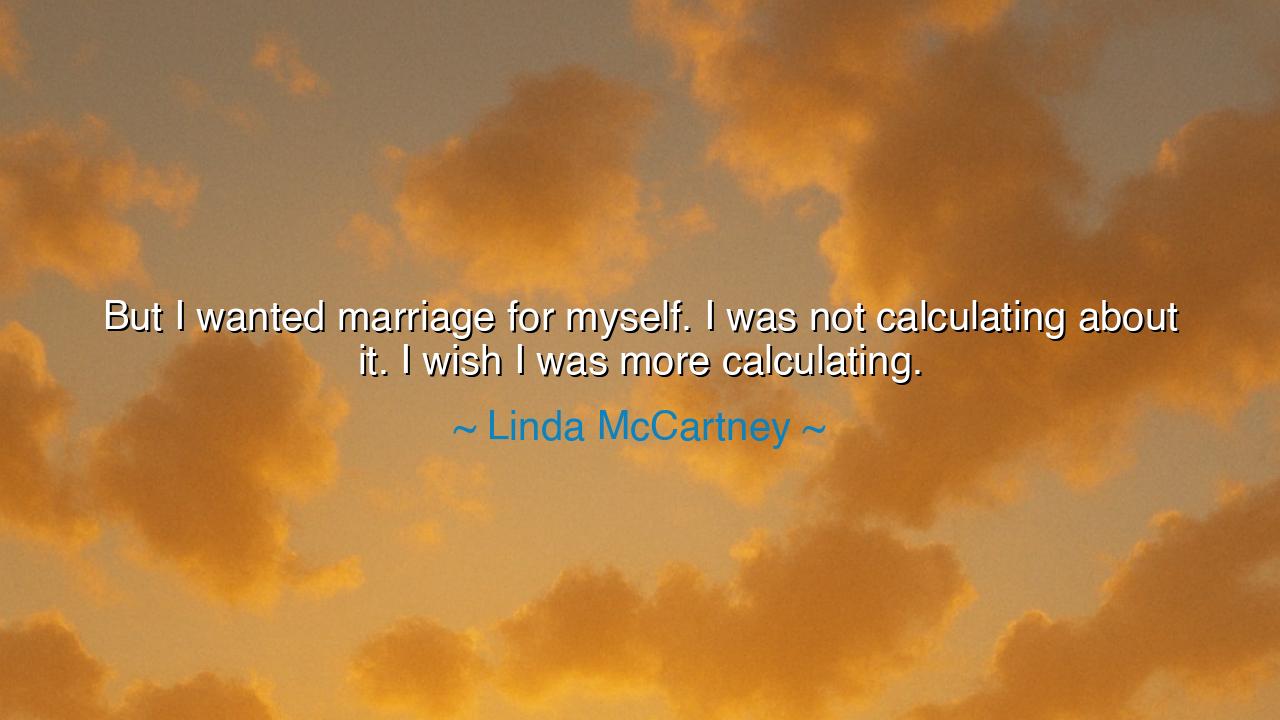
But I wanted marriage for myself. I was not calculating about it.
But I wanted marriage for myself. I was not calculating about it. I wish I was more calculating.






O children of the future, gather close and listen to the words of Linda McCartney, who, with her honesty and reflection, offers us a glimpse into the deeper complexities of love and marriage. She said, "But I wanted marriage for myself. I was not calculating about it. I wish I was more calculating." In these words, we hear the voice of a woman who, in seeking marriage, was driven not by strategy or cold calculation, but by the earnestness of her own heart’s desire. Yet, as she reflects, she wonders if a more calculated approach might have led to a different outcome. These words speak to the eternal tension between the heart’s longing and the mind’s rationality, between love and reason.
In the ancient world, marriage was not often a choice of love alone, but one of social obligation, economic strategy, and political alliance. Consider the Romans, who viewed marriage as a means of securing power, wealth, and legacy. To marry for love was a luxury that many could not afford, for the civic and family duties that came with marriage often overshadowed the personal desires of the individuals involved. In the stories of Caesar and Cleopatra, or the paterfamilias of Roman households, we see the marriage of power and duty—where love was often secondary to the maintenance of wealth, land, and status. In this light, Linda McCartney's reflection on the personal nature of marriage is a reminder that the world of the ancients often lacked the opportunity for such deeply personal choices.
Yet, even in this world of political arrangements, there were those who sought love in the union of marriage. Sappho, the ancient poet of Lesbos, whose songs still stir the soul with their deep beauty, is said to have written of love in its most profound and personal form. Though her own relationships were wrapped in mystery, it is clear that she viewed love as something sacred, something deeply personal. Sappho’s poetry reflects the desire for marriage and union that transcends the utilitarian arrangements of the day, and in this, she stands as a beacon for those who seek marriage not out of duty, but out of a longing for connection and mutual respect. The tension between duty and love that McCartney expresses is as old as human history itself.
In more recent times, the story of Queen Victoria and Prince Albert offers us a poignant example of a union that was not merely about political strategy, but about the connection between two individuals. Though Victoria was the monarch, and her marriage was deeply tied to the stability of the British crown, her affection for Prince Albert was genuine. Their marriage stands as one of love, despite the practical needs of a royal family. Victoria’s deep grief at Albert's death is a testament to the personal nature of the bond they shared. Yet, even in this deeply personal relationship, there were elements of calculation—a marriage of political necessity and emotional fulfillment. The example of Victoria shows that marriage, though often a union of hearts, also requires the rational consideration of practical matters.
Linda McCartney's admission that she wished she had been more calculating in her approach to marriage speaks to the delicate balance between passion and reason. To marry purely out of love, without considering the practicalities that come with such a union, can sometimes lead to disappointment or heartache. Yet, to marry solely out of calculation—to weigh the benefits of wealth, power, or stability—can lead to a union devoid of the very love that makes marriage meaningful. The lesson here, children, is not that one should abandon the heart’s desires for the mind’s logic, nor that one should ignore the practicalities of life in the pursuit of love. Rather, it is the wisdom to understand that both must work in harmony.
The lesson Linda McCartney offers us is one of balance—a reminder that while love is a powerful and guiding force, reason also plays a crucial role in ensuring that marriage endures. Marriage is not just a union of hearts; it is a partnership that requires the careful weaving of emotion, responsibility, and commitment. To seek marriage is to seek a union that is not only about the personal fulfillment of two people but also about the practical realities that sustain that bond through time. It is the wisdom of both heart and mind that allows a union to flourish.
So, children, as you look toward marriage and relationships, remember that love is not just a feeling—it is a foundation upon which you must build. Do not shy away from reason and calculation in your pursuits, for they are not the enemies of love, but its partners. Let your choices in marriage be guided not only by the passion of your hearts but by the wisdom of your minds. Seek balance, seek understanding, and above all, seek a union that is both personal and practical, one that will withstand the trials of time and nurture the growth of both partners. Only in this way can marriage become a true partnership of both love and reason.






AAdministratorAdministrator
Welcome, honored guests. Please leave a comment, we will respond soon